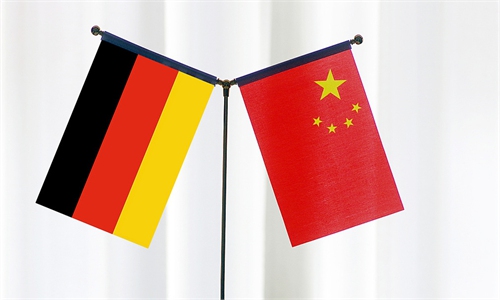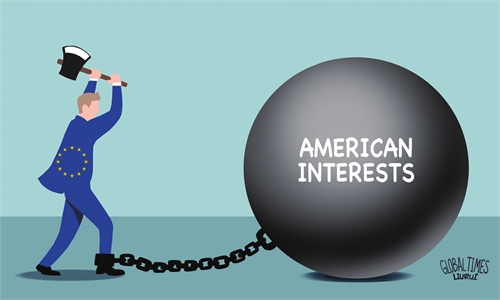
The China-Europe freight train featuring e-commerce exports leaves Xi'an, Northwest China's Shaanxi Province. Photo: IC
A double-digit drop in German exports to China has triggered debate and concerns in Europe's biggest economy over whether it has become the victim of "mounting security and trade tensions between Beijing and Washington," the Financial Times reported on Wednesday.
It is true that statistics from various sources point to a declining trend in trade between Germany and China in recent months. According to the Financial Times, in the first four months of this year, German exports to China plunged 11.3 percent year-on-year. Figures from the Chinese customs showed that during the January-April period, China's imports from Germany slid 3.9 percent year-on-year in US dollar terms, while bilateral trade declined 6.2 percent.
It should be noted that while the specific reasons behind the fall in German exports to China are complicated, the current debate in Germany actually underscores simmering tension and doubts as to whether it is necessary to follow the US strategy toward China to such a degree, which may come just in time.
On the one hand, this reflection and fear are in part derived from challenges facing the German economy. Germany's economy shrank 0.3 percent in the first quarter of 2023, entering a technical recession, according to revised figures released on Thursday by Destatis. Germany is expected to be the weakest performer among the world's big economies this year, according to the IMF. German manufacturing is facing pressure on multiple fronts from an energy transition, increased international competition, potential industrial losses and being undercut by the US.
On the other side, the US, in an effort to contain China's development, has imposed various technology export controls, trade sanctions, and a "decoupling" strategy toward Chinese businesses and has pressured its allies to follow suit. The growing geopolitical risks have distorted the global industrial and supply chains, leaving German exporters worried about falling victim to China-US tensions. In fact, more and more countries and their businesses are sharing such concerns recently, such as South Korea, Japan and the Netherlands.
Nevertheless, it should be made clear that although Germany's policy toward China is still vacillating, it doesn't mean just because it is a US ally, China will adopt a different trade policy toward Germany or any other country. In fact, China has always been pushing for strengthened cooperation with Germany. Relevant authorities have listened to the suggestions and problems from German companies, and are trying to solve them and dispel their concerns over expanding their business in China.
Shu Jueting, a commerce ministry spokesperson, said on Thursday that the Chinese government will unswervingly expand high-level opening-up, continue to foster a market-based, law-based and international business environment, and welcome more German companies to invest and operate in China. At the same time, it is hoped that Germany will provide a fair, just and non-discriminatory business environment for Chinese companies' investment and operation in Germany and promote open and pragmatic cooperation between the two sides.
China has been Germany's largest trading partner for many years, while Germany is China's largest trading partner, largest source of foreign investment and an important investment destination in Europe.
But the key problem facing bilateral economic and trade cooperation is that some in Europe want to handcuff Germany to US foreign policy. Their criticism to some joint China-German projects such as Volkswagen's Xinjiang plant and a Chinese company's stake in Hamburg port reflects nothing but their disregard for the German economy.
Under such circumstances, Germany's domestic reflection on its exports to China is a pushback on geopolitical risks, and represents a return to pragmatism.



